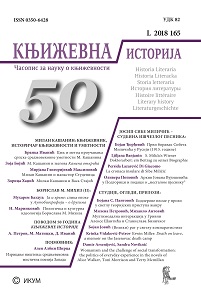Изрицањe ништења: средњoвековна мистична поезија Запада
The saying of annihilation: western medieval mystical poetry
Author(s): Alen Albin ŠircaSubject(s): Theory of Literature
Published by: Институт за књижевност и уметност
Keywords: mysticism;mystical experience;religious poetry;mystical paradox;apophaticism;
Summary/Abstract: The article deals with the complex realm of the relation between poetry and mysticism. The term ”mysticism”, which can arouse a wide range of association, has here a very distinct meaning: it points to the deepest stratum of a religion. Clearly, since we are focusing on Western mystical poetry, the term ”mysticism” here points out to specificities of Christian mysticism. However, there is common ground for scientifically treating mysticism in general, and that is by way of mystical experience. In contrast to ordinary religious experience, which is focused on various devotional, ascetical and liturgical practices, mystical experience is directed to mystical union (unio mystica). Yet, here one does not deal only with euphoric experience of ecstasy, for unio mystica can be achieved only through ”the fire” of negativity, annihilation. It is only for the price of this annihilation, that this ultimate ground of mystical experience is reachable. This Absolute has many names (in Christianity, for example, Nothing, One, Godhead, etc.). Therefore, the chief thesis of the article is that mystical poems always lie in the horizon of mystical experience. That mean that mystical poetry has intrinsic apophatic (negative) structure. To speak with Meister Eckhart, perhaps the greatest Christian mystic, ordinary religious poetry is focused on God as he is revealed (as got, according to Eckhart), whereas mystical poetry is always directed to a-phenomenological Godhead (gotheit, or niht). These ”ideological” characteristics are, at the same time, reflected on formal, purely verbal level of mystical poem. It is of no wonder, then, that favourite verbal vehicles of mystical poetry have always been paradoxes, oxymora, hyperbole, catachresis, etc. Although one of the basic conditions of mystical language is silence, meaning that mystics have always acknowledged that mystical experience itself is fundamentally ineffable, uncommunicable, the language of mystical poem must, in last analysis, become performative, and even autoreferential; in other words, it must ”do” what it says. The rise of Christian mystical poetry in the West may be detected in High Middle Ages (13th century) when it has developed in the social context of beguines (sometimes acknowledged as the first European women movement) and early radical Franciscans, and by its literary characteristics should belong at the core of Western canon. The article attempts to demonstrate this on the examples of five poets: Hadewijch, Mechthild of Magdeburg, Marguerite Porete, Jacopone da Todi and anonymous author of poem »Granum sinapis«. For all these poets could be maintained that they do not only sing about ecstatical experience of nuptial (or erotic) union with God, but they rather seek to express the fundamental break, rupture, a movement of negativity, that seems to transform experience into some kind of un-experience – and precisely this radical annihilation – that is always annihilation of the self – is conditio sine qua non for union with the Divine. This paradoxical structure of Christian mystical poetry that emphasises the deconstruction of the (poetic) self, along with often abstruse and hermetical utterances, anticipates, at least in part, modern, or even modernist poetical strategies.
Journal: Књижевна историја
- Issue Year: 50/2018
- Issue No: 165
- Page Range: 149-170
- Page Count: 22
- Language: Serbian

